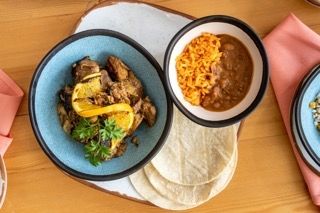Is Mexican Food Healthy And Balanced? Unpacking the Nutritional Conveniences of Standard Components
The question of whether Mexican food is healthy invites an expedition of its typical components. Beans and corn function as foundational staples, abundant in healthy protein and fiber. Avocados provide useful fats, while various herbs and seasonings include flavor and health and wellness advantages - happy hour. With each other, these parts create a tapestry of nutrition. However, the healthfulness of Mexican cuisine typically relies on preparation techniques and portion dimensions. What role do these factors play in establishing its general dietary worth?
The Power of Beans: Protein and Fiber-Rich Staples
Although commonly neglected, beans work as a keystone of Mexican cuisine, supplying a wide range of nutritional benefits. Rich in healthy protein, they are a superb plant-based alternative for those seeking to satisfy their nutritional healthy protein needs. This high healthy protein material supports muscular tissue repair service and development, making beans invaluable for both vegetarians and meat-eaters alike. In addition, beans are a remarkable source of dietary fiber, which aids in food digestion and advertises a feeling of fullness, possibly aiding with weight monitoring.
The selection of beans used in Mexican recipes, such as black beans, pinto beans, and kidney beans, adds to a diverse flavor account and can enhance dishes nutritionally. Beans are low in fat and include important vitamins and minerals, consisting of iron, magnesium, and folate. Together, these characteristics make beans an essential active ingredient, supplying both nourishment and nutrition in conventional Mexican fare.

Corn: a Versatile Grain With Nutritional Perks
Corn stands apart as a flexible grain fundamental to Mexican cuisine, celebrated not only for its cooking applications but also for its outstanding dietary profile. As a key active ingredient in recipes like tortillas, tamales, and pozole, corn supplies vital nutrients that add to a balanced diet regimen. Rich in carbs, it works as a substantial power resource, while likewise being reduced in fat, making it a favorable alternative for various nutritional demands.
Corn is an excellent source of nutritional fiber, which helps in digestion and advertises satiety. It consists of substantial amounts of vitamins such as B-complex vitamins, which are vital for power metabolism. The presence of anti-oxidants, especially carotenoids, contributes to overall health by minimizing oxidative tension. Furthermore, corn is gluten-free, satisfying those with gluten sensitivities. Generally, the dietary benefits of corn underscore its value in conventional Mexican food and its function in a healthy diet regimen.
Avocados: Healthy And Balanced Fats and Nutrients in Every Bite
Avocados play a substantial role in Mexican cuisine, enhancing meals with their creamy structure and rich taste. Beyond their culinary charm, avocados are commemorated for their excellent dietary profile. They are an abundant resource of healthy and balanced monounsaturated fats, which can aid reduced negative cholesterol degrees and assistance heart wellness. Additionally, avocados are packed with crucial vitamins and minerals, consisting of potassium, vitamin E, and B vitamins, adding to overall health.
The high fiber web content in avocados help digestion and promotes satiety, making them an advantageous addition to any kind of meal. Their special nutrient composition can also support skin health and wellness and provide anti-inflammatory advantages. Incorporating avocados into typical Mexican dishes or enjoying them as a standalone treat can improve both flavor and nutrition, showing why they are a precious staple see post in Mexican food. In general, avocados offer a scrumptious means to delight in healthy fats and vital nutrients in every bite.

Natural Herbs and flavors: Flavorful Health And Wellness Boosters
While delighting in the abundant tastes of Mexican cuisine, one can not ignore the necessary duty that spices and herbs play in improving both preference and health and wellness. Components such as oregano, chili, and cilantro peppers not just contribute to the vivid taste profile yet also offer considerable wellness benefits. Cilantro is known for its purifying homes, aiding to remove hefty steels from the body, while oregano is loaded with anti-oxidants and has anti-inflammatory effects.
Chili peppers, a staple in many Mexican dishes, include capsaicin, which has been connected to improved metabolism and pain relief. In addition, seasonings like cumin and coriander assistance food digestion and might assist in blood sugar guideline. Including these delicious wellness boosters right into meals not only boosts the cooking experience yet also promotes general well-being, making Mexican cuisine not simply delicious, however likewise nutritionally useful.
Conventional Food Preparation Methods: Enhancing Nutrition and Flavor
Typical cooking methods in Mexican food play a vital duty in enhancing both nourishment and flavor, as they frequently prioritize classic techniques and fresh active ingredients. Techniques such as nixtamalization, where corn is saturated and cooked in an alkaline service, not only improve the nutrient profile of tortillas yet likewise improve their digestibility - happy hour. In addition, the use of slow cooking approaches, like cooking Continued or braising, permits flavors to blend sushi hiro perfectly while preserving the honesty of the ingredients

Regularly Asked Inquiries
Are Mexican Food Portions Generally Larger Than Various Other Cuisines?
Mexican food portions are usually larger than those of several various other foods. This particular shows standard eating techniques, stressing communal sharing and hearty meals, which can result in a more significant serving dimension overall.
Exactly how Does the Preparation Approach Affect Healthfulness of Mexican Food?
Prep work approaches substantially affect the healthiness of Mexican food. Methods such as barbecuing or steaming maintain nutrients, while frying can raise harmful fat material. Choices of ingredients and cooking styles ultimately establish overall dietary value.
Can Mexican Food Be Customized for Details Dietary Limitations?
Mexican food can certainly be customized for details dietary restrictions. Alternatives, such as using corn tortillas for gluten-free diet plans or incorporating more vegetables, make it possible for individuals to enjoy typical tastes while suiting various dietary needs.
What Are Common Mistaken Beliefs Regarding Mexican Food and Health And Wellness?
Usual mistaken beliefs about Mexican food include the belief that it is inherently unhealthy, extremely spicy, and exclusively focused on fats. Actually, conventional dishes often feature nutritious components and can be tailored to numerous nutritional needs.
Are There Much Healthier Choices at Mexican Dining Establishments?
Healthier choices at Mexican restaurants often include smoked meats, beans, and fresh veggies. Selecting recipes that stress whole components and staying clear of heavy sauces can bring about a much more nourishing eating experience, promoting total health.
The variety of beans utilized in Mexican recipes, such as black beans, pinto beans, and kidney beans, adds to a varied flavor profile and can boost dishes nutritionally. Avocados play a substantial duty in Mexican cuisine, enhancing dishes with their luscious appearance and rich taste. Integrating avocados into typical Mexican meals or enjoying them as a standalone snack can enhance both taste and nourishment, demonstrating why they are a precious staple in Mexican food. While appreciating the abundant flavors of Mexican food, one can not neglect the crucial function that spices and natural herbs play in boosting both taste and wellness. Conventional cooking approaches in Mexican food play a vital duty in improving both nutrition and flavor, as they frequently prioritize fresh ingredients and time-honored methods.